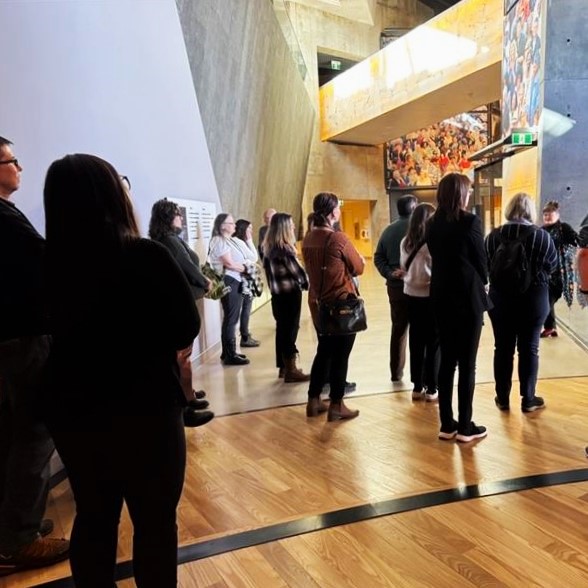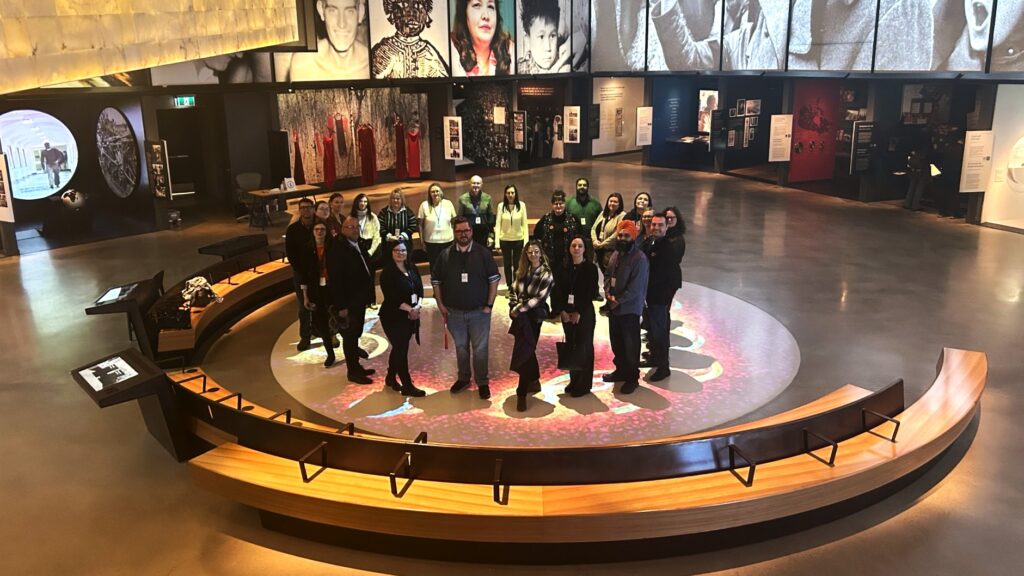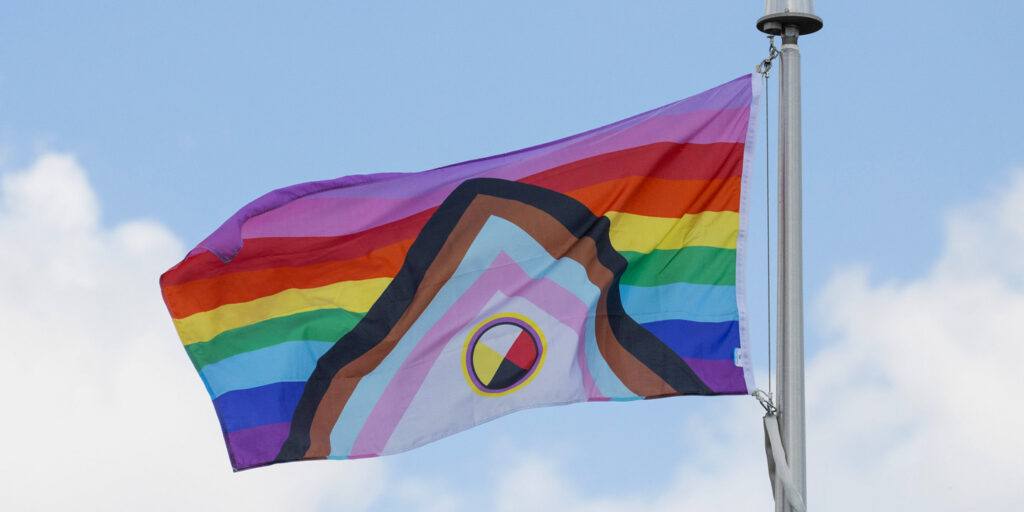Education and Action in Truth and Reconciliation – The Witness Blanket
In February, RRC Polytech held the first Witness Blanket Tour at the Canadian Museum for Human Rights (CMHR).
This new interactive offering builds on the previously offered KAIROS Blanket Exercise and provides further ways to engage our community in reconciliation efforts.
Twenty-three staff, guided by Ininew Knowledge Keeper and Community Services instructor Marilyn Dykstra, explored several exhibits that shed light on the traumatic histories and ongoing injustices experienced by Indigenous communities that culminated in a tour of the Witness Blanket.
Exhibits highlighted the atrocities of the Residential School system, the forced displacements of First Nations, Métis, and Inuit communities, the enduring impacts of the Sixties Scoop, and the continued overrepresentation of Indigenous children in the child welfare system. Participants explored narratives surrounding Missing and Murdered Indigenous Women, Girls, and Two-Spirit People, as well as the histories of Two-Spirit identities and their reclamation within Indigenous communities.
The Witness Blanket is a permanent installation at the CMHR in its own gallery with open space for observers to reflect and consider the stories of each object woven into the Witness Blanket. The installation is composed of reclaimed objects from Residential Schools, churches, government buildings, and cultural sites across Canada and organized into the pattern of a blanket. Each object in the Blanket carries a story – memories of suffering, survival, and resilience.
“The work I do isn’t just about teaching our true histories to those who don’t know – it’s also been part of my own learning and healing journey. Even when people continue to deny, dismiss, and diminish what those kids went though, the Witness Blanket is a testament to the truth,” said Dykstra.
“When I saw the Witness Blanket ten years ago for the first time, I stood there. And I cried. It means something to everyone. Just like how the school bell means one thing to someone that went to a public school, that sound meant something very different for someone that went to Residential School.”
One of the most haunting pieces is framed in the centre of the Blanket – the door from the boys’ infirmary at St. Michael’s Residential School in Alert Bay, British Columbia. This door, once closed to conceal abuse and neglect, now remains permanently open to honour Survivors and to invite the truth. Carey Newman, the creator of the Witness Blanket, stated: “I didn’t ever want the door on the Blanket to be closed… I make sure the door is always open, so there is nowhere for any secrets to hide.”
After the tour, participants returned to RRC Polytech to feast the experience. The afternoon continued with a Sharing Circle, led by Joanna White, Indigenous Educational Curriculum Developer, where each participant voiced their thoughts, emotions, and reflections in a safe and supportive environment.
“The experience wasn’t walking around and listening to a tour guide – it engaged all of the senses. Moving between the different spaces; seeing and watching and reading; listening to Marilyn relate her own experiences, her family’s, her community’s, her nation’s, the museum’s; the scent of smudge; the feast we shared together. The immersion was an incredible way to actively participate and learn before we gathered to reflect and debrief in the afternoon,” said Giselle Martel, Vice President, Finance & Administration.
This tour is a demonstration of RRC Polytech’s ongoing commitment to Truth and Reconciliation in education as a continuous and evolving journey. By creating opportunities for faculty and staff to engage with Indigenous histories, perspectives, and knowledge, we are taking responsibility for the tangible steps we can make toward fostering an environment that acknowledges the past and actively works toward a more just and equitable future.
“Many Indigenous students face struggles that faculty may not be aware of – these struggles aren’t just in the past, they continue today. Challenges borne from intergenerational trauma can impact students’ education in profound ways, and understanding the things that precipitate their experiences is key to better supporting them,” said Nelson Oliviera, Acting Chair, Transportation.

A significant aspect of this work is recognizing that many individuals currently in the workforce were not provided with standardized Truth and Reconciliation education during their schooling. The education available today offers a much deeper understanding of the historical and ongoing injustices faced by Indigenous Peoples. By fostering a culture of collaboration and social justice, we ensure that all staff and faculty are equipped with the awareness and tools necessary to contribute meaningfully to reconciliation.
“Learning about Indigenous history has really helped me to reconsider some biases I learned, and it has helped me recognize those biases in others. When I did the Blanket Exercise Training years ago, it was very difficult to understand how this could happen. Knowing this history is an important reminder that we always need to treat others with dignity and respect, because these histories are their histories – people go through things that we don’t always know, and it has real impacts for people today,” said Sukhjot Singh, security guard.
The strides made by the Truth and Reconciliation and Community Engagement Department in partnership with other areas like Organizational Development and the School of Health Sciences and Community Services demonstrate how we’re embedding reconciliation into ongoing education and professional development. This commitment is more than policy – it is an active process of learning and unlearning, a reshaping of our understanding of a colonial history so Indigenous histories, perspectives, and knowledge are recognized and woven into the fabric of our institution in a more holistic, truthful understanding of how we came to be.

The Witness Blanket and Canadian Museum for Human Rights Tours will be held monthly, except for July and August, for staff and faculty to attend. If you would like to register for upcoming iterations of the Witness Blanket and CMHR Tour, staff can go to HRIS > My Portal > My Learning > Learning Library > More > search “Witness Blanket”.


